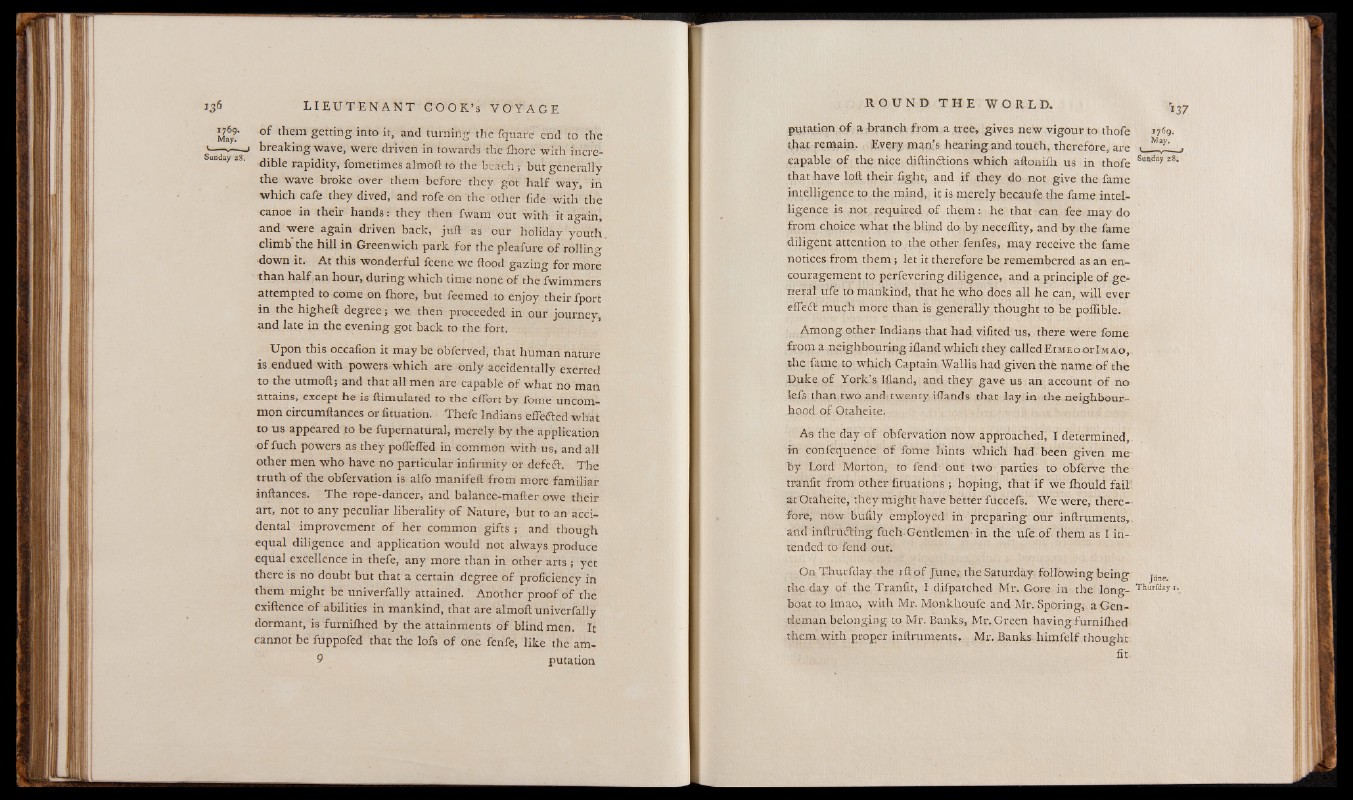
of them getting into it, and turning the fquare end to the
breaking wave, were driven in towards the fhore with in ere-
. ■ ay 2 ‘ dible rapidity, fometimes almoft to the beach I but generally
the wave broke over them before they got half way, in
which cafe they dived, and rofe on the other fide with the
canoe in their hands: they then fwam out with it again,
and were again driven back, juft as our holiday youth
climb the hill in Greenwich park for the pleafure of rolling
down it. At this wonderful feene we flood gazing for more
‘than half an hour, during which time none of the fwimmers
attempted to come on fhore, but feemed to enjoy their fport
in the higheft degree; we then proceeded in our journey,
and late in the evening got back to the fort.
Upon this occafion it may be obferved, that human nature
is endued with powers which are only accidentally exerted
to the utmoft; and that all men are capable of what no man
attains, except he is ftimulated to the effort by fome uncommon
circumftances or fituation. Thefe Indians effedted what
to us appeared to be fupernatural, merely by the application
■ of fuch powers as they pofieffed in common with us, and all
other men who have no particular infirmity or defeft. The
truth of the obfervation is alfo manifeft from more familiar
inftances. The rope-dancer, and balance-mafter owe their
art, not to any peculiar liberality of Nature, but to an accidental
improvement of her common gifts ; and though
equal diligence and application would not always produce
equal excellence in thefe, any more than in other arts ; yet
there is no doubt but that a certain degree of proficiency in
them might be univerfally attained. Another proof o f the
exiftence of abilities in mankind, that are almoft univerfally
dormant, is furnifhed by the attainments of blind men. It
cannot be fuppofed that the lofs of one fenfe, like the am-
9 p u t a t io n
putation of a branch from a tree, gives new vigour to thofe »769.
that remain. Every man’s heating and touch, therefore, are ■
capable of the nice diftin&ions which aftonifh us in thofe Su“day 28‘
that have loft their fight, and if they do not give the fame
intelligence to the mind, it is merely becaufe the fame intelligence
is not required of them: he that can fee may do
from choice what the blind do by neceflity, and by the fame
diligent attention to the other fenfes, may receive the fame
notices from them; let it therefore be remembered as an encouragement
to perfevering diligence, and a principle of general
ufe t6 mankind, that he who does all he can, will ever
effedt much more than is generally thought to be polfible.
Among other Indians that had vifited us, there were fome
from a. neighbouring illand which they calledEiMEoorlmao,
the fame to which Captain. Wallis had given the name of the
Duke of York’s Ifland, and they gave us an account of no
lefs than two and twenty illands that lay in the neighbourhood:
of Otaheite.
As the day of obfervation now approached, I determined,
in confequence of fome hints which had been given me
by Lord Morton, to fend out two parties to oblerve the
tranfit from other fituations hoping, that if we fhould fail’
at Qtaheite, they might have better fuccefs. We were, therefore,
now bufily employed: ;n preparing our inftruments,,
and inflructing fuch G'entlemen in the ufe o f them as I intended
to fend out.
On Thurfday the tftof June, the Saturday following being jdne
the day of the Tranfit, 1 difpatched Mr. Gore in the long- Th^Hay i.
boat to Imao, with Mr. Monkhoufe.and Mr. Sparing,.a Gentleman
belonging to Mr. Banks, Mr. Green having furnifhed
them, with proper inftruments.. Mr. Banks himfelf thought
fit.